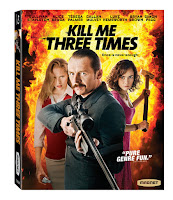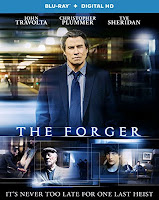- Details
-
Parent Category: Film and the Arts
-
Category: Reviews
-
Published on Tuesday, 14 July 2015 23:04
-
Written by Kevin Filipski
Blu-rays of the Week
Here Is Your Life
(Criterion)
One of the finest debut films in history, Swedish director Jan Troell's epic-length 1966 examination of a teenager becoming a man (based on novels by Eyvind Johnson) honestly, bittersweetly, humorously and without sentimentality presents everyday working life in all its quotidian glory, with an extraordinary cast and the singular eye of an artist in the form of Troell, who co-wrote, edited and photographed his first masterpiece. That he would go on to make more quietly exceptional films from The Emigrants and The New Landto The Flight of the Eagle, Land of Dreams and Everlasting Momentsis a mark of Troell's genius, a filmmaker nearly equal to his countryman Ingmar Bergman.
Interlude in the Marshland, Troell's magnificent 1965 short, crams more incident, feeling, characterization, detail and insight into 30 minutes than most other directors do in two hours; its inclusion as an extra—in a restored hi-def transfer, like the feature—provides further illumination into Troell's rich career, which began with a bang and is still going strong five decades later. Other extras are new interviews with a personable Troell, lead actor Eddie Axberg and Troell's producer/co-writer Bengt Forslund, and director Mike Leigh's appreciation.
(Arrow USA)
This knowing 1980 ripoff of the original Alien and remake of Invasion of Body Snatchers, directed by Italy's Luigi Cozzi, is about malevolent Martian eggs which, when exploded, graphically annihilate whatever unlucky stiffs are nearby. It's as insane as it sounds, but Cozzi doesn't care; even though the goriest fun is in the first half, a ludicrous finale in which the egg queen is introduced is nothing if not grossly icky.
A final shot at the foot of the World Trade Center suggests a sequel that (thankfully?) never was made. On Blu, the movie has an appropriately grainy look; extras include a commentary, Q&A with Cozzi and star Ian McCulloch, Cozzi interview and vintage on-set featurette.
(Cohen Film Collection)
Erik Greenberg Anjou's engaging documentary concerns that American culinary innovation, the Jewish deli, of which there were thousands across the country a half-century ago; now, however, there are only a handful left, including New York's famous Carnegie, Katz's and Second Avenue Delis.
Anjou structures his film around Ziggy Gruber, proprietor of a thriving deli in Houston, although he does visit New York, Toronto, Chicago, and Los Angeles to check in with others still making Jewish comfort food for a smaller but still supportively loyal clientele. The hi-def transfer is quite good; extras comprise featurettes and additional interview snippets with deli fans from Jerry Stiller and Fyvush Finkel to Alan Dershowitz and Larry King.
(Magnet)
Fans of Simon Pegg will enjoy his gleefully nasty turn as a jaded killer whose increasingly desperate attempts to finish his latest job keep getting interrupted in director Kriv Stenders' nasty black comedy.
Although the rest of the cast is on the same wavelength as Pegg, notably the slyly funny Alice Braga as the cheating wife he's after, Stenders keeps the unsure tone wavering throughout, even if the viciously violent finale gives Pegg the chance at a classic blackout line. The movie looks first-rate on Blu; lone extra is a making-of featurette.
(IFC)
Director Roland Joffe made his name in the '80s with political films set in faraway lands, namely The Killing Fieldsand The Mission; his latest has a superficial similarity but that's about it.
Exotic locations take a back seat to a tepid time-travel story (a scientist who gets bopped on the head and knocked out finds himself in colonial India as a British soldier wooing a beautiful princess) that's essentially a routine rom-com; sharp camerawork and editing and dazzling leading ladies Bipasha Basu and Tamsin Egerton are unfortunately offset by a dull Josh Hartnett as the hero. The movie looks ravishing in hi-def; lone extra is a making-of.
The Tall Blond Man with One Black Shoe
(Film Movement Classics)
Only the French could make a broad farce about a violinist mistaken for a double agent, but unbelievably, this 1972 flick became a huge international hit—even its sequel, The Return of the Tall Blond Man with One Black Shoe, was a colossal success.
Director Yves Robert is anything but subtle, but his game cast (led by Pierre Richard, Jean Rochefort and the sultry Mireille Darc) provides genuine if intermittent laughs, enough to make its 91 minutes go by quickly. The restored film looks excellent on Blu.
(Kino Lorber)
Based on the 19th century vampire story Carmilla, Bret Wood's hoary gothic melodrama follows the budding romantic relationship between Carmilla, a drifter who arrives in a small town to find out why her mother disappeared, and Laura, a shy waitress whose father holds very dark secrets about her own mother...and Carmilla's as well.
Presented with little finesse, the movie becomes quietly but steadily risible, even with the best efforts of actresses Hannah Fierman and Christen Orr, both very fine in their underwritten roles; William Katt is too hammy as the unhinged father. The film looks decent on Blu; extras comprise deleted scenes, making-of and 2008 Wood short, The Other Half.
Beyond Zero
(Icarus)
The latest in director Bill Morrison's unique found-footage documentaries marries devastating and evocative footage from the trenches of World War I with Aleksandra Vrebalov's haunting but repetitive chamber music, which is skillfully played by Kronos Quartet.
Even at 40 minutes, the movie becomes slightly wearying, but the primitive power and beauty of the images, often disappearing or melting away before our very eyes, remains. A Kronos featurette is the lone extra.
(IFC)
The debut feature of Junebug screenwriter Angus MacLachlan, this engaging comic drama introduces the slightly daffy Otto, who is dealing with a divorce from his unfaithful wife, keeping a relationship with his young daughter and handling a dating scene that comprises one night stands more than anything.
Anchored by the extremely likeable Paul Schneider as Otto, the film is also buoyed by the always delightful presence of the always shamefully underused Anna Camp, who contributes a priceless bit as a sexually adventurous but guilt-ridden churchgoer who may be Otto's perfect woman.
(Lionsgate)
An intense and provocative look at a dramatic and fateful day in Northern Ireland, director Yann Demange's drama follows a British army recruit (Jack O'Connell) who, after a fellow soldier is killed by an IRA sympathizer, finds himself stuck behind enemy lines, trying to stay alive and finding himself helped by people he thought would want him dead.
Despite its ultra-realism (a pub bombing is sickeningly authentic) and persuasive performances, '71 is marred by implausibilities like close-range missed shots and a gun with an endless supply of bullets. The lone extra is an audio commentary.
(Zeitgeist)
Based on her own experiences in the military, writer-director Talya Lavie's black comedy about how women are treated—and treat one another—in the Israeli armed forces has many perceptive moments, but is sidetracked by the weight of an unexpected suicide and a final, ridiculously overwrought catfight that features staple guns.
Still, this mostly on-target film features sharp direction and a superb cast across the board. Extras comprise two Lavie shorts and a making-of featurette.










































